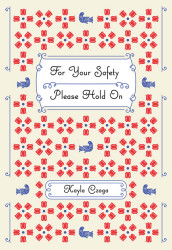For Your Safety Please Hold On
Kayla Czaga
Nightwood Editions
96 pages, $18.95
Reviewed by Kelly Shepherd
It’s exciting to review a book with so many award-winning poems. I was a little nervous, even, when starting to read it. But I was quickly drawn in to Kayla Czaga’s large and eccentric (yet eerily familiar) extended family, and within the first few pages of her debut collection, For Your Safety Please Hold On, I willingly got into the car for the road trip, for the small town coffee joints and the provincial parks of northern B.C. But this is not a book about the road, although it is haunted by stories of leaving one place and arriving at another; its concerns are much more domestic. It’s a geography of interiors, landmarked with brown floral couches and potato salad on soggy paper plates and houseplants shivering in the cold.
Originally from Kitimat, Kayla Czaga lives in Vancouver where she recently completed an MFA in Creative Writing at the University of British Columbia. Some of the poems in this collection have won several of Canada’s most prestigious literary prizes, including The Fiddlehead‘s 23rd annual Ralph Gustafson Poetry Prize, The Malahat Review‘s 2012 Far Horizon’s Award for Poetry, and an Editor’s Choice Award in ARC Poetry Magazine‘s 2012 Poem of the Year Contest. Among others.
For Your Safety Please Hold On is divided into five sections that follow the narrator through sketches of her parents and family, from small town childhood to living alone in the city. Despite their often somber themes—the unspoken violence of childhood, family illnesses and deaths, the Sandy Hook school shooting—there is nonetheless a playfulness and an almost joyous energy running throughout these poems. There is wordplay: in the long poem “Many Metaphorical Birds,” a philosophical coffee barista “is Hegeling with a customer” and “Adornoing his pastry case.” There are surprising turns of phrase on every page. The family is “wicked with worry”; a nickel is a “slender metaphor.”
“The Drunk Uncle,” one of the family case-studies, wears “the same old skull T-shirts for thirty years / to unnerve his mother.” He has “buddies for every occasion”; he “yammers / the nails, beats the dead horse, bags the wind, / blows it hot and beery into your face.” Attending the same family gathering is “The Decorative Aunt,” who belongs to “the Ativan side of the family, / bejewelled and bleached, leather-shoed / from therapeutic tanning-bed snoozes.” In “The Other Grandmother” both the family legend and the immigrant experience are writ large, almost approaching hagiography.
“Your other grandmother walked barefoot across Europe with your infant father.
[…]
Your other grandmother drank her husbands
under the coffee table. She slapped your cheeks
with stories, kissed you with myth, carried
on into all hours, carrying children on
both her hips and shoulders.”
These irreverent family portraits, replete with awkward personal details and pop-culture references, are reminiscent of characters in an early Douglas Coupland novel. In some instances, however, their detached tone might be a little too effective: they feel disconnected, almost callous. It’s as if the narrator were an ethnographer attempting objective field notes, but unable to resist using playful figurative language at the same time. The reader isn’t quite sure what to do. When “The Grandmother” is compared to a “silly old child” with “lilac slacks / billowing out from her twig body”—and when the narrator confesses “[w]hen she died you had just started / university in a new city and weren’t / allowed to attend her funeral”—it’s hard to know if the poem intends wry tenderness, or alienation.
Nonetheless, I admire Czaga’s eye for minutiae, for the sense of glow and wonder in the smallest details. These poems are lyrical and funny, honest and sad, sometimes painfully so. The car is cold, the nighttime streets are lonely, and the dashboard is cluttered with distractions and nostalgia, but this is a ride I wouldn’t want to miss.
Kelly Shepherd lives in Edmonton and has a Creative Writing MFA from UBC Okanagan. His fifth poetry chapbook, Fort McMurray Tricksters, was recently published by Vancouver’s Alfred Gustav Press. He is a poetry editor for the environmental philosophy journal The Trumpeter.

{ 0 comments… add one now }